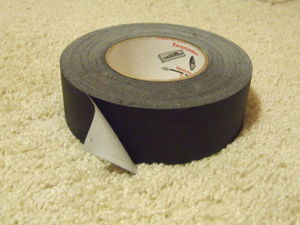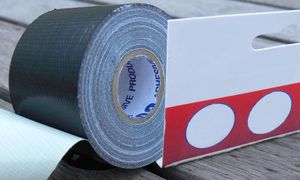Gaffer tape
Gaffer tape, gaffer's tape, gaff tape[1] or gaffa tape[2] is a strong, tough, cotton cloth pressure sensitive tape that adheres strongly but can be removed cleanly. It is used on theater, film and television productions as well as live performances and any other kind of stage work.[3] The tape is often referred to as a production expendable because it is discarded after the production process is complete.
Uses
The most common use for gaffer tape is securing cables to the stage floor or other surface, either for safety or to keep them out of view of the audience or camera. Camera assistants use short strips of different colors to lay blocking markers for actors. Similarly, a narrow version of gaffer tape, called spike tape, is used in theatre productions for floor layout. It is also used whenever a quick ad-hoc fix is required, from temporarily attaching fixtures or props, to salvaging a broken piece of production equipment. In the absence of console tape or artist tape, live sound engineers may use a strip of white gaffer tape along the bottom of a mixing board, to label the channels used for a particular show.
It is also widely used by audio-visual departments in hotels and conference centers for holding down wires to podiums and stages. It can also be used as a waterproof packaging tape and some grades even meet packaging certification standards such as ASTM D5486. Some musicians use it on their fingers to prevent blisters.[citation needed] Bagpipe players often use 1/4" wide Gaffer tape to partially cover some holes on the chanter when tuning the bagpipes.
The tape is manufactured in many colors, including fluorescent and custom colors, but the most common variety is matte black. A matte finish keeps the tape from reflecting light so the tape blends in with the typical stage floor of a theatre.[4] Gaffer tape combines excellent strength properties with the ability to be ripped by hand, so no cutting tools are necessary. The adhesive used is a high quality synthetic rubber which leaves little or no residue when removed and typically does no harm to whatever the tape is applied to. It usually comes in 2"-wide rolls, and the cloth composition allows a consistent tear, which means it easily tears into two 1" strips, if needed.[5]
It is named for the gaffer, the head of the lighting department on a film crew. When cables are taped down on a stage or other surface, either for safety or to keep them out of view of the audience or camera,[6] they are said to be gaffed or gaffered.
Gaffer tape generally costs 3 to 4 times the amount of a roll of duct tape of equivalent length; this is because it is manufactured in much smaller volumes, and to different specifications that make it easy to tear and to remove cleanly.
References
Cite error: Invalid <references> tag;
parameter "group" is allowed only.
<references />, or <references group="..." />See also
|isbn= value: invalid character (help)

